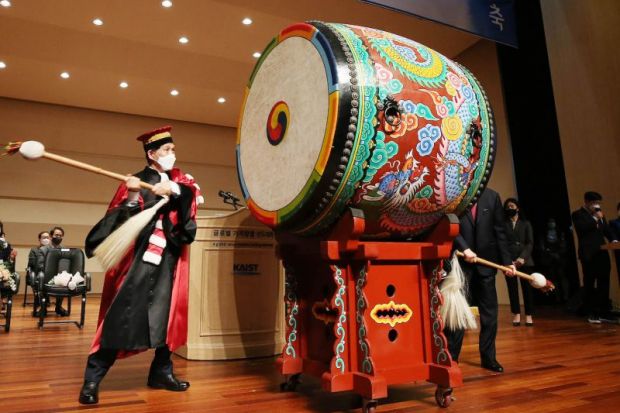The new president of the Korea Advanced Institute of Science and Technology (KAIST) has called on South Korea to embrace failure as a learning opportunity.
During his inauguration on 8 March, Kwang Hyung Lee said KAIST could become one of the world’s top 10 universities if it achieved its goals of “producing creative global talent, staying ahead of new research topics, and producing corporations that will lead the nation’s industries”.
The artificial intelligence expert, nicknamed the “godfather of venture start-ups” for his mentoring of some of South Korea’s technology pioneers, emphasised growth via industry income and internationalisation.
Professor Lee said he wanted KAIST to achieve “financial independence” by boosting annual revenue from technology commercialisation fees to 100 billion won (£63 million), in 10 years. One step in this process will be the privatisation of the university’s Institute of Technology Value Creation.
Perhaps most strikingly, Professor Lee pushed back against a conservative society that prizes academic success above all else. Instead, he proposed “a new culture in which failing would not be stigmatised”.
“Every start-up cannot be successful. Failure is not the end of the world, especially for young people. I hope they will learn from failures and make other better opportunities,” Professor Lee told Times Higher Education.
“For that, they should keep questioning everything fearlessly, about themselves and what went wrong. To keep questioning is another process of learning and the purpose of good education. That makes us contemplate what we should do and makes us very creative.”
In his inauguration address, Professor Lee called the school’s new strategy “QAIST”, with the “Q” standing for “questioning”.
“We should build an institutional infrastructure in which we can provide various opportunities for young students to start over, whether it be [relating to] academic or career issues,” he said. “We are brainstorming various ways to support them to recuperate when facing setbacks in their academic [pursuits] and entrepreneurship.”
Professor Lee plans to reshape recruitment to attract 15 per cent of the student body and faculty from overseas. Currently, 9 per cent of its intake are international students. He also said KAIST would continue overseas expansion. In 2019, it had set plans for opening Kenya-KAIST in the African nation, with an aim of welcoming students in 2023.
He also aimed to have women in 25 per cent of faculty positions, following a gender quota set by the government last year.
KAIST, which was established 50 years ago, is in 13th place in the THE Asia University Rankings, and is in the top 100 of the THE World University Rankings.




